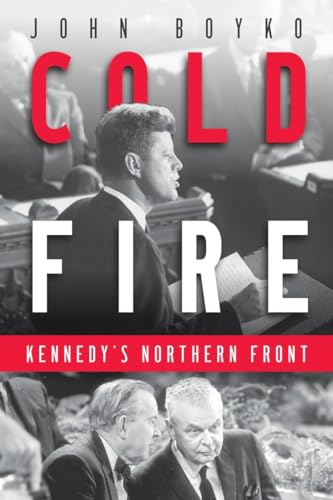
Cold Fire
by John Boyko
"Kennedy's Northern Front"
Popularity
3.3 / 5
* A book's popularity is determined by how it compares to all other books on this website.
Where to buy?
Buy from Amazon* If you buy this book through the link above, we may receive a small commission at no extra cost to you.
Cold Fire by John Boyko
Details
Biography:
Yes
Region:
North America
Page Count:
386
Published Date:
2016
ISBN13:
9780345808936
Description
Main Themes and Topics
Cold Fire by John Boyko delves into a tumultuous period during the Cold War, focusing on the relationships and power struggles between key North American leaders: U.S. President John F. Kennedy, Canadian Prime Minister John Diefenbaker, and Liberal leader Lester Pearson. At the heart of the narrative is the delicate balance of sovereignty and security. Boyko provides a deep exploration of how these leaders' differing visions and diplomatic strategies impacted their countries' roles in the Cold War, the fear of nuclear war, and the broader global political landscape.
Writing Style and Tone
John Boyko is known for his engaging narrative style, blending rigorous historical research with compelling storytelling. In Cold Fire, Boyko continues to display his ability to make complex political and historical themes accessible to a wide audience. His tone is both informative and captivating, ensuring that readers remain invested in the unfolding drama of diplomatic maneuvering and political strategy. The use of newly released documents adds depth and authenticity to the narrative, offering insights that are both enlightening and, at times, shocking.
Awards and Recognition
While specific awards for Cold Fire are not mentioned, John Boyko has been acclaimed as a historian with a talent for narrative flair. His previous works have received positive recognition, which positions Cold Fire as a noteworthy addition to his repertoire.
Brief Summary
Cold Fire takes readers back to a critical juncture in the Cold War, challenging preconceived notions about the Kennedy years. The book examines the intricate relationship between the U.S. and Canada against the backdrop of global tension. It highlights the ideological clash between Kennedy's vision for America and Diefenbaker's commitment to Canadian sovereignty, with Pearson navigating a middle path. The narrative reveals Canada's discreet yet crucial role during the Cuban Missile Crisis and other pivotal moments, all underscored by the ever-present threat of nuclear conflict.









